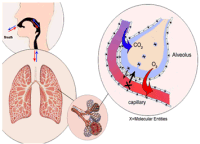Research Projects

Design and Development of Novel Breath-based Medical Diagnostics
R&D Team: Dr. Donn M. Dennis1, Dr. Christopher D. Batich2, Dr. Charles R. Martin3, Dr. Richard J. Melker1,4, Dr. Timothy E. Morey1, Dr. Brij Moudgil2,5, Dr. Stephen Pearton2, Dr. Jon Stewart3, Dr. Weihong Tan3, Dr. Manoj Varshney1,5.
1Departments of Anesthesiology, 2Department of Materials Science and Engineering, 3Department of Chemistry, 4Department of Biomedical Engineering, 5Particle Engineering Research Center (PERC)
Opportunity and Impact: Medical diagnostic tests have traditionally been performed predominantly on either blood or urine. Although a few tests in recent years have been developed for saliva, sweat or hair, blood and urine-based  tests have continued to be considered the “gold” standards. With the exception of breath-based alcohol testing, little attention was given to breath as a novel diagnostics media. The UF nanomedicine team in partnership with Xhale Diagnostics (http://www.xhalediagnostics.com) is poised to challenge that status quo. By designing and developing novel nanosensors using existing clusters of research excellence at UF such as the Center for Research at the Bio/Nano Interface, PERC, and the nanofabrication capabilities within the $35M Nanoscale Research Facility currently being constructed at UF (opening late 2007), our goal is to develop novel breath-based technologies that effectively address critical unmet medical needs in 3 major markets: 1) glucose monitors, 2) “SMART” (Self Monitoring and Reporting Therapeutics) drug systems that will ensure medication adherence and reduce adverse drug reactions (ADRs), and 3) drugs-of-abuse testing (DAT) devices.
tests have continued to be considered the “gold” standards. With the exception of breath-based alcohol testing, little attention was given to breath as a novel diagnostics media. The UF nanomedicine team in partnership with Xhale Diagnostics (http://www.xhalediagnostics.com) is poised to challenge that status quo. By designing and developing novel nanosensors using existing clusters of research excellence at UF such as the Center for Research at the Bio/Nano Interface, PERC, and the nanofabrication capabilities within the $35M Nanoscale Research Facility currently being constructed at UF (opening late 2007), our goal is to develop novel breath-based technologies that effectively address critical unmet medical needs in 3 major markets: 1) glucose monitors, 2) “SMART” (Self Monitoring and Reporting Therapeutics) drug systems that will ensure medication adherence and reduce adverse drug reactions (ADRs), and 3) drugs-of-abuse testing (DAT) devices.
The UF-Xhale team intends to replace many of today’s blood and urine-based tests with simple breath-based testing in consumer healthcare. Diabetics will be able to test their glucose  level with a cell phone-sized device carried in the pocket, replacing painful and inconvenient finger-prick devices. For roadside screening of driving impairment, a point-of-care device similar in function to a handheld breath alcohol analyzer will detect drugs of abuse such as cocaine. In the setting of chronic oral drug therapy, mortality/morbidity and the cost of health care will be markedly reduced by developing “smart” drug systems that document in a “fool proof” manner that drugs were administered and are being properly metabolized. The UF-Xhale team believes breath-based testing devices will solve significant medical problems while simultaneously bringing a paradigm shift to existing markets and opening up new market opportunities.
level with a cell phone-sized device carried in the pocket, replacing painful and inconvenient finger-prick devices. For roadside screening of driving impairment, a point-of-care device similar in function to a handheld breath alcohol analyzer will detect drugs of abuse such as cocaine. In the setting of chronic oral drug therapy, mortality/morbidity and the cost of health care will be markedly reduced by developing “smart” drug systems that document in a “fool proof” manner that drugs were administered and are being properly metabolized. The UF-Xhale team believes breath-based testing devices will solve significant medical problems while simultaneously bringing a paradigm shift to existing markets and opening up new market opportunities.
Breath-based testing devices will be more convenient, efficient and cost-effective than blood and urine-based testing equipment. Breath-based tests will allow real time results because, unlike other biological media, exhaled breath is present on a continuous, non-invasive basis. Breath sampling does not require the same separation steps needed with blood and urine samples. Further, there is no risk of tampering or masking the results of a breath sample. In nearly every way, breath has the potential to be a superior means of determining the presence or concentration of substances in the blood.
Project Description: The UF-Xhale team is uniquely equipped to successfully execute this product development program and is comprised of experts with highly relevant expertise in medicine (Dennis, Melker, Morey), pharmaceutical drug R&D (Dennis), enzymology (Stewart), molecular identification (Tan, Stewart), analytical chemistry (Varshney), sensor development (Martin, Norton, Pearton, Tan), and materials chemistry (Moudgil). This project contains the following aims: 1) understand the physiology of the relation between breath and blood concentration for different analytes, 2) understand the interaction of material surfaces with analytes, 3) design the optimal breath collection systems, 4) develop relevant chemistry, 5) develop optimal sensors, and 6) execute proof-of-concept studies at the biological level to support future IND filings and clinical studies.